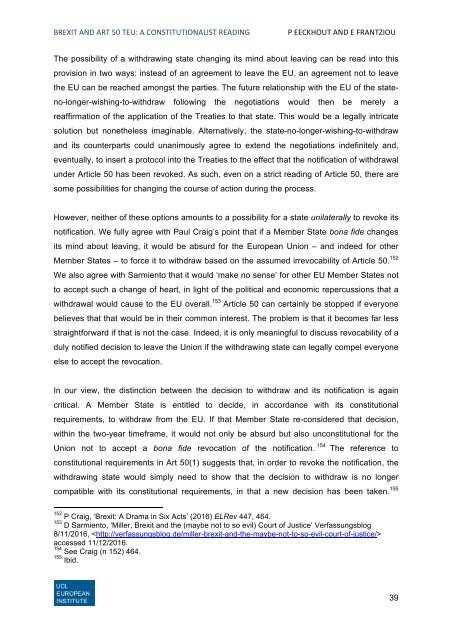brexit-article-50
brexit-article-50
brexit-article-50
You also want an ePaper? Increase the reach of your titles
YUMPU automatically turns print PDFs into web optimized ePapers that Google loves.
BREXIT'AND'ART'<strong>50</strong>'TEU:'A'CONSTITUTIONALIST'READING''''''''''''''''''''P'EECKHOUT'AND'E'FRANTZIOU'<br />
The possibility of a withdrawing state changing its mind about leaving can be read into this<br />
provision in two ways: instead of an agreement to leave the EU, an agreement not to leave<br />
the EU can be reached amongst the parties. The future relationship with the EU of the stateno-longer-wishing-to-withdraw<br />
following the negotiations would then be merely a<br />
reaffirmation of the application of the Treaties to that state. This would be a legally intricate<br />
solution but nonetheless imaginable. Alternatively, the state-no-longer-wishing-to-withdraw<br />
and its counterparts could unanimously agree to extend the negotiations indefinitely and,<br />
eventually, to insert a protocol into the Treaties to the effect that the notification of withdrawal<br />
under Article <strong>50</strong> has been revoked. As such, even on a strict reading of Article <strong>50</strong>, there are<br />
some possibilities for changing the course of action during the process.<br />
However, neither of these options amounts to a possibility for a state unilaterally to revoke its<br />
notification. We fully agree with Paul Craig’s point that if a Member State bona fide changes<br />
its mind about leaving, it would be absurd for the European Union – and indeed for other<br />
Member States – to force it to withdraw based on the assumed irrevocability of Article <strong>50</strong>. 152<br />
We also agree with Sarmiento that it would ‘make no sense’ for other EU Member States not<br />
to accept such a change of heart, in light of the political and economic repercussions that a<br />
withdrawal would cause to the EU overall. 153 Article <strong>50</strong> can certainly be stopped if everyone<br />
believes that that would be in their common interest. The problem is that it becomes far less<br />
straightforward if that is not the case. Indeed, it is only meaningful to discuss revocability of a<br />
duly notified decision to leave the Union if the withdrawing state can legally compel everyone<br />
else to accept the revocation.<br />
In our view, the distinction between the decision to withdraw and its notification is again<br />
critical. A Member State is entitled to decide, in accordance with its constitutional<br />
requirements, to withdraw from the EU. If that Member State re-considered that decision,<br />
within the two-year timeframe, it would not only be absurd but also unconstitutional for the<br />
Union not to accept a bona fide revocation of the notification. 154 The reference to<br />
constitutional requirements in Art <strong>50</strong>(1) suggests that, in order to revoke the notification, the<br />
withdrawing state would simply need to show that the decision to withdraw is no longer<br />
compatible with its constitutional requirements, in that a new decision has been taken. 155<br />
152 P Craig, ‘Brexit: A Drama in Six Acts’ (2016) ELRev 447, 464.<br />
153 D Sarmiento, ‘Miller, Brexit and the (maybe not to so evil) Court of Justice’ Verfassungsblog<br />
8/11/2016, <br />
accessed 11/12/2016.<br />
154 See Craig (n 152) 464.<br />
155 Ibid.<br />
39


